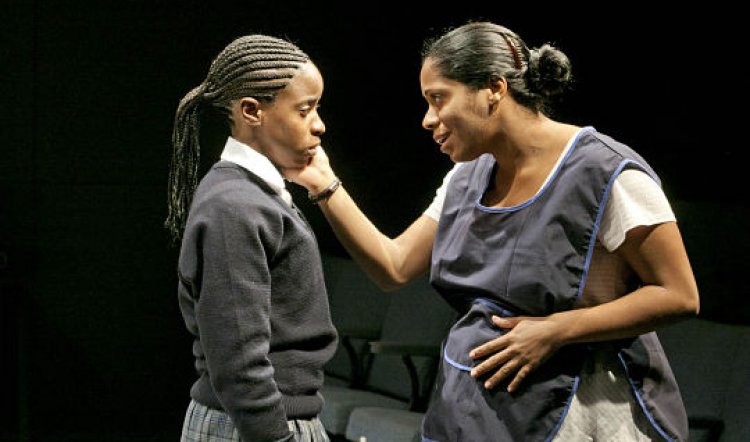
MY WONDERFUL DAY
MY WONDERFUL DAY, Ensemble Theatre Kirribilli, May 12-June 25, 2011. Photos by Steve Lunam.
THE CAST of this Australian premiere production of Alan Ayckbourn’s 73rd play is exceptional. And it features, as nine-year-old Winnie Barnstairs, a brilliant newcomer in 21-year-old Belinda Jombwe, a NIDA and University of Sydney graduate. Winnie – actually Winona, but expect a baleful stare if you call her that – is not well and off school for the day. Her harried mother Laverne (Shareena Clanton – another startlingly good find – from the WAAPA class of 2010; director Anna Crawford did a great job finding them) has to take Winnie along to her cleaning job, which makes Laverne even more anxious. And when she’s anxious she gabbles. A lot.
Laverne’s film director employer Paula is (significantly, it transpires) not at home; instead Laverne has to contend with her husband, Kevin. Kevin Tate (Mark Owen-Taylor) is what is known in middle class Hampstead parlance as an arrogant prat. He’s also a TV personality and not too good in the mornings, nor with having to live with his wife’s BAFTA award. Paula keeps it on the bedside table the better to torment him with her greater success.
In classic Ayckbourn fashion, these well drawn, easily recognisable types are introduced with a mix of comedy and almost docu-drama. Laverne is a single mother, her husband having long taken off for pastures younger; she dreams of returning to her family’s origins: Martinique. But with her flat, slack-jawed, glottal-stopped London accent and congenital diffidence, you wonder how she would fare if the dream ever became reality. Winnie, meanwhile, is preternaturally and painfully wise; the long silent look she gives her mother when the Martinique brochure comes out of the handbag is really sad. It’s clear that Winnie has few daydreams and fewer hopes; she just wants to get on with it. Whatever it turns out to be.
Completing the unlikely group that fetches up in the smart London home are Kevin’s hung over pal Josh (Brian Meegan) and – ahem – secretary Tiffany (Matilda Ridgway). Summonsed when Kevin realises Paula has flown the coop, Josh and “Tiffy” are really on hand to spread and share the load of comic and dramatic possibilities. Meanwhile, Laverne has given Winnie strict instructions to keep quiet, sit still, not annoy Kevin and to get on with her homework.
Winnie is a dutiful little girl: you can’t imagine her being anything as crass or childish as “naughty”. Every Tuesday she and her mother speak French – because that’s how she will learn the language, says Laverne. “Oui maman,” says Winnie obediently and they chatter on, to the bemusement of their class betters, in a strangled if grammatically correct Franglais. It’s both charming and sad as a sly comment on aspiration and dreams. Meanwhile, Winnie’s homework is to write an essay entitled “My wonderful day”. In it she is supposed to observe and report on her day as it unfolds. And that’s what she does. And that’s where the playwright pulls an unexpected and dazzling rabbit out of his box of tricks.
Ayckbourn has been writing his uniquely simple-yet-(deceptively)-complex middle class farces forever and he’s uniquely good at them. Indeed, for some years his facility led to disdain on the part of critics even as audiences couldn’t get enough of him. But latterly, he’s also tended towards glib: the tricky balance of acid and heart that characterises the best of his work has sometimes been missing. With My Wonderful Day however, he’s found form and a central character that transcends and subverts the genre and our expectations.

Winnie is a masterly creation. Betrayal, greed, jealousy, hypocrisy, revenge, racism, infidelity and condescension suddenly take on completely different and very awkward meanings when seen through the eyes of a child. And that’s how the audience sees these unpleasant traits: as the wide-eyed, solemn child observes the heedless adults from a position of invisibility. They talk through, around and over her, rarely noticing the ever-present exercise book and steadily writing hand. It’s both hilarious and awful – and ought to make many so-called grown-ups reconsider the way they behave towards and around kids.
The 90 minute, one-act play takes a sudden turn when Laverne goes into premature labour and is carted off to hospital. Shortly afterwards Paula (Danielle Carter) unexpectedly and inopportunely returns to the house. Marital mayhem isn’t far behind and all the while Winnie keeps observing and keeps writing. That there’ll be tears before bedtime is a given and in this instance, tears maybe induced by laughter as well as sympathy for Winnie and Laverne.
For the audience there has to be a sense of privilege and luck at seeing the earliest flowering of two sparkling new talents: Belinda Jombwe and Shareena Clanton are intelligent, subtle and tremendous as mother and daughter and at 21 and 22 respectively, are stars of the future – particularly if the usual Australian stupidity over casting women of colour can be overcome. The rest of the cast are relative veterans by comparison and make up a fine ensemble; Mark Owen-Taylor’s comic timing and willingness to make a ghastly fool of himself brings the narcissistic TV celeb to gloriously awful life, while, as his silly popsy Matilda Ridgway is a fountain of gushing silliness, sincerity and total inability to relate to children or adults. Amid much hysteria and bad behaviour Brian Meegan’s support is vital in that he is a literally somnolent presence for much of the action. Winnie begins to read to him and in a moment he’s quietly snoring. It’s a seemingly simple thing but all too easily overplayed – and he doesn’t. Last but not least, Danielle Carter has the unenviable task of having to arrive at full stretch very late in the piece and be a hard-nosed but wisecracking bitch into the bargain. She does it beautifully and is very funny.
So My Wonderful Day is a triumph for the actors, yet it could have been so much more. That’s because the direction, set and lighting are woefully inadequate to the task of “an Alan Ayckbourn play”. Farce is the most technically demanding theatrical genre because it must appear to be free-flowing and carefree while actually as tightly choreographed and drilled as an SAS raid. And Ayckbourn adds another layer of difficulty in the staging and lighting if the production is to fly. The Ensemble space is a tricky one, but that doesn’t excuse what is possibly the worst use of it I can remember. Instead of sharply delineated spaces and scenes – made clear through specific and focused lighting and a well thought out set, the actors are forced to battle through with no help from either creative element. It’s a miracle that they’re as good as they are and, despite these shortcomings, they pull off a memorable night in the theatre.



